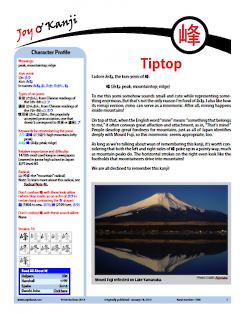峰
peak, mountaintop; ridge
Kanji 1799
Thank you for visiting this Character Home Page. Below you'll find a synopsis of the essay. If you wish to read the full text, the PDF of the essay is available for purchase to the right.
Packed with fun quizzes and great photos, this short essay teaches you to talk about soaring peaks, successive peaks, and the tallest mountain in a range. You'll find out why people compare Mount Fuji to a lotus blossom. The essay also pays close attention to yomi issues, including an unusual pattern of phonetic changes and the oddity of an identical kun-yomi and on-yomi.
Revision history:
Mar. 29, 2024: p. 6, 1st sidebar: Deleted a broken link.
Feb. 23, 2024:
- p. 2: Slightly improved the Mount Yatsugatake sentence translation.
- p. 2: Deleted the statements that 岳 can mean “peak” but more often represents “high mountain." I've now said simply that it often serves as the suffix to mountain names.
- p. 2: Revised the explanation of the legend. I can't be sure, but I suspect that Wikipedia (my source on that) changed its own wording about the legend.
- p. 5: Corrected several things about the Mount Okuhotakadake sentence.
June 22, 2021: p. 1: Deleted a stray punctuation mark.
Jan. 23, 2020:
- p. 2: Etymology Box: Replaced the old Henshall etymology with the new one.
- p. 9: Added a link to the Kanshudo games.
Feb. 18, 2014: Changed p. 6 to reflect that 峯 is the variant form of 峰, not the old form.
Jan. 18, 2013: Originally published.



Comments